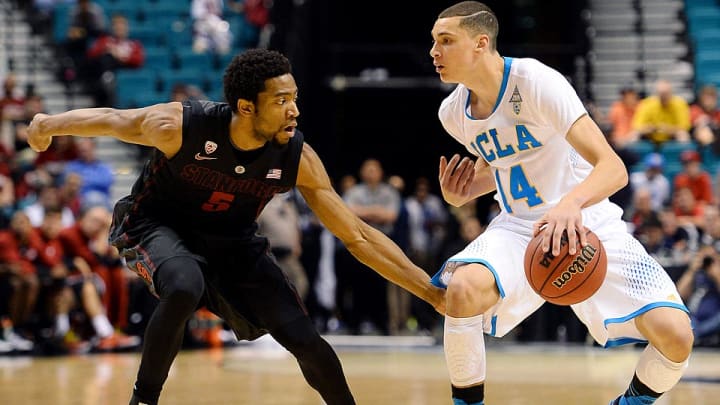Zach LaVine selected by Timberwolves with No. 13 pick in NBA draft

The Timberwolves selected Zach LaVine with the 13th pick in the NBA draft on Thursday. Here’s a look at LaVine and how he fits with Minnesota:
Bio: UCLA | Freshman | Point guard
Vitals: 6-6, 181 pounds
2013-14 stats: 9.4 points, 2.5 rebounds, 1.8 assists, 44.0 FG%, 37.5 3FG%
Strengths: One need only look at this photo of LaVine leaping 46 inches at a workout with the Lakers (reportedly a team record) to know his best attribute: athleticism. During his freshman year at UCLA, LaVine was known to throw down some vicious dunks. LaVine also shot well for part of last season – he went 16-of-25 from three-point range during a five-game stretch in November and December (his percentages dipped later in the year) – and is a particularly effective finisher on the break. LaVine turned 19 in March, so he still has plenty of time to round out some of the rougher edges of his game. His athleticism and scoring potential make him an intriguing prospect.
2014 NBA draft: Point guard rankings
Golliver: /omer-asik-trade-rockets-pelicans
Weaknesses: For a player who projects as a potential NBA point guard, LaVine’s distribution skills are suspect. LaVine posted an assist rate of 12.6 percent last season, just more than one third of teammate Kyle Anderson’s 34.3. His lean frame can pose issues against bigger, more physical defenders and he has trouble finishing in traffic. LaVine’s shooting numbers dipped precipitously after a hot start; he scored just eight points combined in UCLA’s three NCAA tournament games. Shot selection can be an issue for LaVine, who tends to settle for inefficient, mid-range jumpers. LaVine had his share of issues defensively, though he does have the size and quickness to improve.
Team Fit: The 6-6 combo guard gives the Wolves a shot of pure explosion in their backcourt. He's as quick off the dribble as any player in this class, though not quite mature enough as a decision maker to run an offense full time. Sharing the floor with Ricky Rubio, then, is a nice compromise. LaVine will pressure defenses with scoring in a way that Rubio never does, but without the sort of every-possession responsibility that could exacerbate the rookie's flaws.
If Minnesota maintains its transition-heavy style, LaVine will have the space and freedom to showcase his basketball wares. It will be interesting, though, to see if a smaller offensive role might also help him create shots more cleanly in half-court situations. LaVine wasn't particularly effective in grinding out points against against set defenses in college, but playing on a team with more pressing threats may open up a few scoring windows. If not, at least the prospect of LaVine's running the floor opposite Rubio is a tantalizing one.
